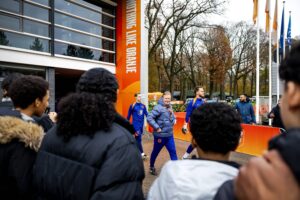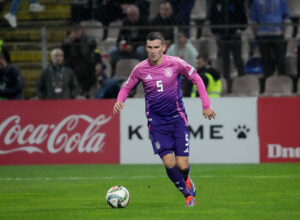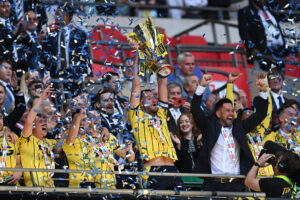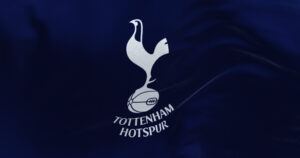This weekend’s North London Derby has every chance of being the least important encounter between Arsenal and Tottenham Hotspur in history. Not only are the two clubs marooned just above mid-table (Arsenal are currently eighth and Spurs ninth) after dismal seasons, but the complete absence of fans due to ongoing social distancing restrictions is likely to take the edge off any lingering tension or enmity. In effect, it will be completely different to the packed, indeed almost overflowing, White Hart Lane in 1971, when Arsenal were competing not just for the league title but for a potential league and cup double to match the legendary achievement of Spurs a decade earlier. It is the fact that Arsenal withstood not only a fine Spurs team but all the other pressure that they were under to win the match and secure the first leg of the double that makes White Hart Lane ’71 undoubtedly Arsenal’s greatest ever North London Derby win.
The Managers, Players and Matches That Made Arsenal. No. 7 – White Hart Lane 1971
No Room for Error
It is probably still the proudest boast of Arsenal fans, at least when it comes to local bragging rights, that the Gunners have won as many League titles at White Hart Lane as Spurs themselves, Arsenal having twice secured the League title at Tottenham’s home ground and Spurs only ever having won two League titles in their history. However, the second time that Arsenal clinched the Championship on the most hostile enemy turf, in the Invincible season of 2004, they did not manage to win the match, after letting a two-goal lead slip late on. Nevertheless, their 2-2 draw was still sufficient to secure the club’s 13th (and so far last) English title.
The situation in 1971 was very different, in that there was almost no room for error at all for Arsenal at White Hart Lane. That was because in 1971, English league placings were still ultimately decided by goal average (the number of goals a team scored divided by the number of goals it conceded) rather than by goal difference (the number of goals a team scored minus the number of goals it conceded). In fact, it was not until the 1976/77 season that goal difference replaced goal average as the deciding factor in English football. Of course, in 1989, Arsenal would famously win the League at Anfield on goal difference. However, in 1971, the use of goal average rather than goal difference led to the extraordinary situation where Arsenal would win the title at White Hart Lane if they either won or achieved a goalless draw, but a score draw of any kind would give the title to Leeds United, Arsenal’s closest challengers at the top of the table.
That mathematical quirk, which constituted a unique form of scoreboard pressure, added to the already enormous pressure on Arsenal as they arrived at Tottenham’s home ground for a night match on Monday 3 May 1971, which was the final league match of the season. It had been delayed from earlier in the season because of Arsenal’s successful run to the FA Cup final, where they would face Liverpool just five days later. Thus, in one week (in fact, in less than a week), Arsenal could either win everything or nothing. It really was a zero-sum series of games.
It Was Different Back Then
The other thing that must be borne in mind nearly 50 years on from that momentous match at White Hart Lane is the relative standing of the two clubs at the time. Put simply, the 1960s had been Tottenham’s best decade in their history, beginning with that truly historic double, which made them the first team in the 20th century to win both the League and the FA Cup in the same season. It had continued with their becoming the first English team to win a European trophy (the 1962/63 Cup Winners’ Cup) and had even extended into the second half of the decade with an all-London FA Cup Final win over Chelsea in 1967. And, for good measure, they had begun the new decade in a similarly successful vein, by winning the 1971 League Cup (beating Aston Villa 2-0 in the February final) just a few months before the crucial home league match against Arsenal.
By complete contrast, the 1960s had been Arsenal’s worst decade since Herbert Chapman had first transformed the club into a trophy-winning machine in the early 1930s. Their previous league title triumph had come in 1953 and since then they had won precisely nothing until they ended nearly two decades of failure with the historic Fairs Cup win in 1970. Nevertheless, by the time Arsenal faced Spurs at the end of the 1971 season, it had been nearly two decades since they had won a domestic trophy, and if they were to end that long trophy drought they would have to overcome their greatest rivals at their home ground.
Generations of Arsenal fans have been raised on the tale of that league triumph at White Hart Lane in 1971. Indeed, it arguably looms even larger in the collective Arsenal imagination than the FA Cup win that followed it five days later, precisely because it was achieved not only against their loathed local rivals (whose fans had never forgiven Arsenal for relocating to North London in the early 20th century from their original home in Woolwich, South London) but on their own pitch. Nearly 20 years before the introduction of all-seater stadia in England, which followed the Hillsborough disaster of 1989, White Hart Lane was completely sold out, with an estimated crowd of 50,000-plus, but it was also estimated that there were nearly twice that number of people in the streets surrounding White Hart Lane as the Arsenal team arrived. That was because Spurs and their fans were absolutely determined to defend their unique historical legacy and remain the only English team in the 20th century to win the double.
An Intense Match
However, if that Arsenal team of 1971 was famously said to be dour and defensive (as epitomised by the scene in Mike Leigh’s film, Life Is Sweet, when a Spurs-supporting character proclaims that “Football died the day Arsenal won the double”), they were also excellent defensively and tremendously tough physically. Men like the captain, Frank McClintock, the goalkeeper, Bob Wilson, and the centre-forward, John Radford, had been with Arsenal long enough to know exactly what they were up against, and they could impart that hard-won experience to younger players like Charlie George and Pat Rice, who had only broken through into the first team in recent years.
Thus, the scene was set for the kind of intense, floodlit, week-night match that Herbert Chapman himself had first envisaged more than 40 years earlier. Chapman, a brilliant innovator who had also dreamt of pitting his great Arsenal side against the best teams in Europe (a dream that would not be realised until the introduction of the European Cup in the mid-1950s, more than 20 years after Chapman’s death), would have relished the sheer, unbridled hostility sweeping down from the terraces and often manifesting itself on the pitch, in an era when tough tackling was not only allowed but positively encouraged by the rules of the game and the men who refereed it. And in the genuinely heroic performance of Bertie Mee’s team that night, Chapman would have recognised a side kindred in spirit to his own all-conquering Arsenal side of the 1930s.
The match itself was far from a classic, but what it lacked in free-flowing football of the kind that Arsène Wenger’s Invincibles produced on the same ground in 2004, it more than made up for in sheer competitive spirit, as the 1971 Arsenal side displayed a defensive tenacity that was probably completely alien to Wenger’s much more attack-orientated outfit. Indeed, perhaps because they knew that a goalless draw would be enough to secure the title, Arsenal were content to play out a game that saw both sides create only a few genuine goal-scoring opportunities. Nevertheless, when the vital chance came, right at the death, Arsenal were still sufficiently alert to take it, as John Radford first forced Pat Jennings (the great Spurs keeper who would later play for Arsenal) to make a good save before George ‘Geordie’ Armstrong got to the rebound and crossed for Radford’s strike partner, Ray Kennedy, to head the priceless winning goal in the 87th minute.
The Greatest Then But Not So Now
That meant that Arsenal only had to hang on for three more minutes, plus extra time, to secure the league title and with it the first leg of the league and cup double. Despite the incredible hostility of the crowd and the renewed efforts of the Spurs players, they managed to hang on without any real scares to win the club’s eighth league title. At the time, that made Arsenal the most successful English football club in terms of championships, before the dominant eras of first Liverpool and then Manchester United saw them replace the Gunners as the English teams with most league titles to their name.
Whatever happens at White Hart Lane this Sunday, it is safe to say that it will have nothing on the genuinely historical importance of the equivalent match in 1971. Whereas now Arsenal and Spurs are only competing to see which of them is the least mediocre, back then the two sides were fighting tooth and nail not only for league positions but for the most important prize of them all – footballing immortality. And in beating a superb Spurs side on their home ground to secure the league title, which set them up perfectly for their come-from-behind win in extra time against Bill Shankly’s Liverpool five days later in the cup final, the Arsenal side of 1971 achieved precisely that.
Main Photo






